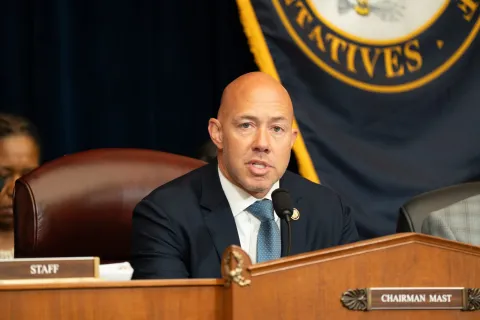Chairman Mast Delivers Opening Remarks at Hearing on State Department Bureau of Political Affairs
WASHINGTON, D.C. – Today, House Foreign Affairs Committee Chairman Brian Mast delivered opening remarks at a full committee hearing titled, “FY26 State Department Posture: Bureau of Political Affairs.”

-Remarks-
Under the Biden administration, the State Department, in my opinion, operated without clear lines of command. I believe that it blurred responsibilities in many cases and had a culture that prioritized process over the outcomes that the State Department would produce.
I would use the DEI office as an example, where they were worried about what the bucket of applicants looked like, rather than the outcomes of those applicants and what they were delivering for the American taxpayer. That was a direct quote from the former DEI Secretary Abercrombie-Winstanley.
That has changed under President Trump and Secretary Rubio.
This Committee is working to restore real command and control at the State Department—something that the Pentagon has had for decades, and something that the State Department desperately needs.
We’re crafting the first comprehensive, standalone State Department Authorization bill in over twenty years—this is not meant as a gesture, it is meant as a serious institutional overhaul.
We’re not doing this for symbolism; we’re doing it because there needs to be common sense and logic within our diplomacy.
Our goal is simple: bring order, bring clarity, and bring effectiveness to a department that too often prioritized institutional interests above the American interest.
A perfect example is how members of Congress in too many cases are more concerned about somebody being fired from the State Department after 10-15 years of employment. When they should be asking how productive those employees were and what were the measurable outcomes that were provided by them approving transgender operas, or drag show tutorials, or DEI musicals, or LGBTQ comic books abroad.
Under President Biden, the Department suffered from a structural identity crisis. Maybe policy was developed by one group, altered by another, and implemented by a third, often with no clear authority or accountability. Turf wars between regional and functional bureaus slowed everything down.
The Under Secretary for Political Affairs is treated as “first among equals,” but that phrase itself reveals to me a problem: too many equals, not enough leadership. No mission succeeds without a chain of command, and I believe that diplomacy is no exception.
The State Department must operate like a strategic institution with a clear hierarchy, mission clarity, decisive leadership, and measurable outcomes. It should not be a think tank that looks at the world as an academic exercise with no measurable outcomes.
And our reforms aim to do just that.
Some will resist this. They’ll defend the status quo as if it’s sacred. But we’ve seen what that status quo produces: mission drift, strategic confusion, and a sprawling bureaucracy that’s often more focused on virtue signaling than actually projecting American strength abroad.
Let us be clear: this is not about copying the Pentagon—it’s about applying common sense. At DOD, policy is made at the top through a chain of command that is recognizable to everybody.
At the State Department, that discipline has been missing. We don’t expect the State Department to be soldiers in uniform, but we should expect it to have a command structure that is recognizable and followed.
We can’t afford what has happened to happen again — not when adversaries like China and Iran are using every tool at their disposal to undermine American power, we can’t have foreign service officers that free lance social experimentation.
Our vision is straightforward. Functional bureaus and undersecretaries should focus on developing policy, clear, coherent, and grounded in national interest. Regional bureaus, with their area expertise, should adapt and execute that policy on the ground. This creates a clear flow of authority, streamlines operations, and ensures accountability at every level.
What we have had are regional bureaus providing loose oversight of embassies that frequently operate like personal fiefdoms rather than the implementing arm of the State Department. Under President Biden, we had embassies funding gender inclusive leadership through ultimate frisbee in India for $100K or spending $425K to help Indonesian coffee companies be more gender and climate friendly.
This hearing is part of a broader effort to realign the State Department with the mission it was meant to serve: putting America First as the State Department of the United States of America. That requires more than tweaks—it requires structural change, cultural change, and a willingness to change the old order.
I want to thank our witness for appearing today, and we look forward to your insight as we take the first steps toward restoring command and control, discipline, and mission focus at the United States Department of State.
###